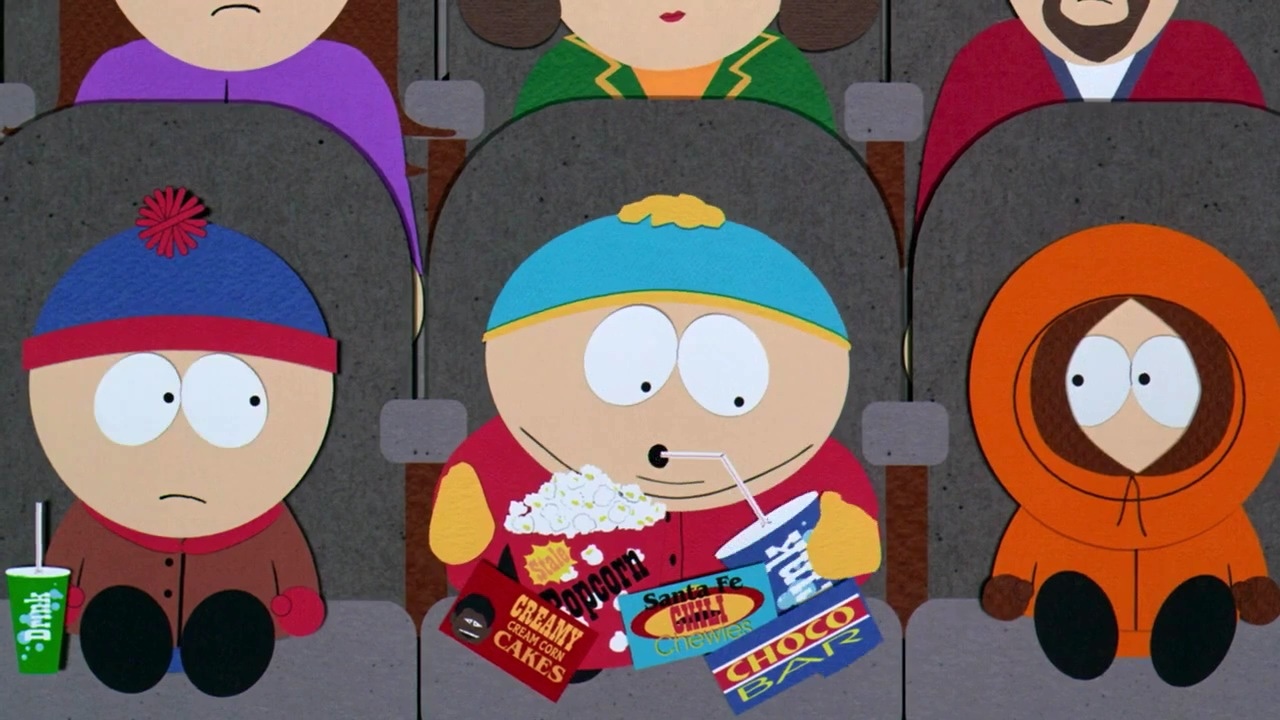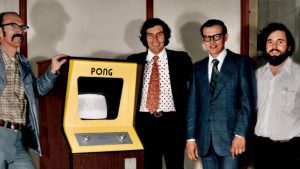
“Let’s make an R-rated cartoon about an R-rated cartoon coming out” was the original concept pitched when Matt Stone and Trey Parker were developing their classic animated musical opus, South Park: Bigger Longer & Uncut. Twenty-five years later, it remains a brilliantly meta idea. But before Canada-blaming glory, South Park’s road to the silver screen was paved with many blockades, mainly from within their parent company of Viacom, which owned both Comedy Central and Paramount Pictures, and their biggest formidable foe, the then-named Motion Picture Association of America (MPAA).
And as if it wasn’t ironic enough, the biggest bone of contention was for the creators’ use of vulgarities within an anti-censorship-centric movie. In typical Matt and Trey fashion, whatever adversary they faced, they rebelled with nastier pushback against. And in the long run, this made for a more memorable film. Here’s a look back at the various obstacles Stone and Parker faced during South Park: Bigger, Longer & Uncut’s contentious production.
“Can you make your movie PG13, pretty please?”
Early into the show’s run, the South Park pair made a condition in their contract clause with Comedy Central, the cable network that greenlit the raunchy animated series, that if they were to ever make a feature South Park adaptation, it would be rated R. Parker and Stone wanted to capture the spirit (pun intended) of their short, “Spirit of Christmas,” which wound up becoming the blueprint for the late night TV series successor. Yet during the film’s early stages of pre-production, Paramount Pictures execs kept demanding in meetings that “you need to make this PG13.”
In the 2009 Blu-ray commentary, Parker recalled the meetings and responding to the pressure with: “Dude, the TV show is PG13. Maybe even R. We can’t make something lesser than the TV shows.”
On one occasion, studio executives sat the duo down and showed them an infomercial along with graph presentations explaining the box office potential in making a PG-13 picture, thanks to audience accessibility. A wider accessible audience of young teenagers, in theory, meant a bigger audience pool (especially as the series was famous for attracting viewers younger than the intended audience). In an April 1999 interview with Entertainment Weekly, Parker lamented, “After they showed us graphs of how much more money we’d make with a PG-13, we were like, ‘R or nothing.’” Eventually, the studio gave in and held up their end of the deal.
‘Hell’ or High Water (or: a Longer Innuendo)
“You mess with the bull, you get the horns” is a saying that could’ve been Stone and Parker’s entire mindset whenever the MPAA gave grief at every given direction of production. But one of their earliest arguments with the MPAA revolved around the film’s initial title. Originally, the duo wanted the feature to be named South Park: All Hell Breaks Loose. But The MPAA prohibited “Hell” to be used in the title. Unrelated, the movie Jason Goes to Hell: The Final Friday was released in 1993.
In the DVD commentary, the filmmakers explained how they brought up other “Hell” tilted features and were met with an excuse that rationalized because South Park was animated, it had to be a G-rated title. Anywho, as retaliation, the boys submitted the retitle as Bigger, Longer and Uncut, an even more scandalous title that the MPAA approved without batting an eye. Can’t get more family-friendly than an uncircumcised penis.
Hy-MPAA-crisy
Across the ratings appeal process, the South Park movie was screened six separate times, and with each viewing it was sent back with an NC-17 rating. Many of these NC-17 ratings were allegedly for the use of coarse and vulgar language. It wasn’t the first time Stone and Parker were hit with an NC-17. Their 1998 indie comedy, Orgazmo, received the same dreaded label from the industry’s version of self-censorship.
However, under the preset of a studio feature, an NC-17 would never fly. Despite being created less than a decade earlier in 1990 as a less stigmatized version of the“X” rating, NC-17 proved just as toxically hard to market to an audience, particularly with many exhibitors and movie theater chains refusing to even screen a movie which earned the NC-17 rating. On Orgazmo, the MPAA refused to tell the duo what they needed to do in order to resubmit for an R-rating. “We don’t give specific notes,” they apparently scolded the then-indie filmmakers.
For Paramount, on the other hand, the ratings board was willing to go into deep discussions with the execs and filmmakers about all the meticulous aspects that needed to be changed in order to essentially negotiate an R-rating. That hypocritical system infuriated Stone and Parker, who didn’t get a chance to fight for themselves when they were indie filmmakers. In an 2000s interview with Playboy, Stone revealed, “They gave Paramount specific fucking notes. To an independent distributor, they wouldn’t give any notes. Why? Because they don’t get any money. They wouldn’t even return your phone calls when you’re putting out a Happiness or an Orgazmo. But when you are in a Schwarzenegger movie, they’ll bargain with you.”
Cartman’s Mom gets piled on
The scene in the South Park movie where the boys search for “how to find the clitoris” on the internet and instead discover a pornographic video of Cartman’s mom getting pooped on by a German man wasn’t originally going to be as “depraved” as it turned out, according to Stone. Initially, the video the boys would see would be Cartman’s mom screwing a horse. They submitted it to the MPAA several times, with a memo penned by Stone noting, “This is one joke we want to fight for.” The MPAA shot it down on every occasion. Hence why it became German poop. At a PaleyFest LA 2000 panel, Stone admitted, “Every time they made us cut something, we put in something worse as a big middle finger to ‘em. Like, alright, watch this? And every time they don’t care.”
Seventh time’s the chaRm
After sending the MPAA seven separate cuts, the movie always came back with an NC-17 rating. The last dismissal from the would-be censors occurred two weeks before release. A marketing person from Paramount called the duo and demanded they recut the film again so it can get an R-rating. In a domino effect motion, this set off a chain reaction where everyone called someone else and freaked out until it worked its way back to the MPAA.
Stone called producer Scott Rudin and freaked out. Then Rudin called up Paramount and freaked out on them. Then Paramount called the MPAA and freaked out on them. Lo and behold, the next day, the film was finally rated R. Stone expressed via Playboy that “not one frame of the movie changed. That’s what fucking bullshit it is. And we have it all documented. They can’t take us to court for libel because it’s fucking true.”
Pushing the boundaRies (yes, I did the letter-R joke again. Sue me)
What constitutes a film being rated R versus NC-17 is so frivolous. As even metatextually joked about within the South Park movie, sheer graphic violence can easily get you an R rating, but overdoing it on profanity or explicit sexual content, aspects of life that are more common in reality, is much further scrutinized.
For instance, another cut occurred in the scene that in the finished film depicts Saddam Hussein whipping out two separate dildos. Originally, the joke was that Hussein’s real penis would be the second gag phallic. The MPAA didn’t like it, so they cut it out. The Mole’s line about how “God is the biggest bitch of them all,” was initially, “God has fucked me in the ass so many times.” The MPAA took umbrage with it.
At the end of the day, South Park barely survived being R-rated with its 399 swears. One more would make it NC-17 by default. The only reason it got by was because of a tidal wave of calls.
At least in the long run, Trey Parker and Matt Stone got their vengeance with Team America: they made the MPAA board watch marionette puppets have gratuitous, shock-value sex for submission. Karma really is an Uncle Fucka.
The post South Park: Trey Parker and Matt Stone Went to War to Stop the Movie Getting a PG-13 appeared first on Den of Geek.











